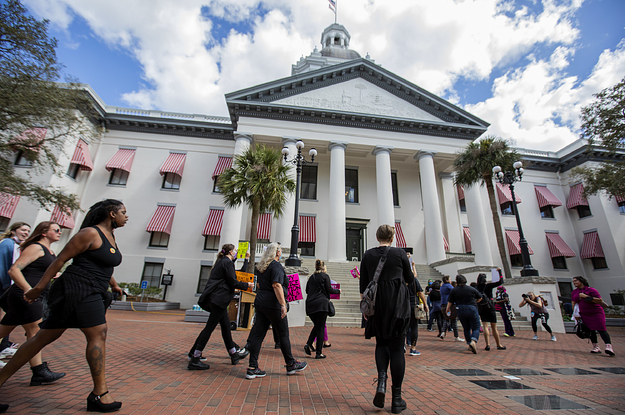
In recent weeks, court battles over mifepristone, one of the two drugs used in medication abortions, which is often referred to as the “abortion pill,” have taken center stage. On Wednesday, a federal appeals court ruled that the pill can remain on the market while legal cases continue, although with stringent new restrictions.
After the Florida Senate approved the proposed six-week ban last week, Florida Senate Minority Leader Lauren Book protested with pro-abortion rights demonstrators outside the state Capitol in Tallahassee. At the protest, the Democratic lawmaker was arrested with nearly a dozen others and charged with trespassing after refusing to leave the demonstration, according to the Guardian.
“With the passage of this dangerous ban, Republicans have chosen to disregard the pleas of women and the doctors entrusted with their care — including two mothers in my own district forced to the brink of death following miscarriages due to the state’s current restrictive laws,” Book said in a statement to BuzzFeed News. “Now, things will get much worse. Women have been stripped of their rights and access to life-saving health care. Women will undoubtedly die. This is not freedom.”
On top of the six-week abortion ban, the bill also allocates $25 million each year to anti-abortion pregnancy centers. Planned Parenthood has warned people seeking abortions that these centers are run by “anti-abortion activists who have a shady, harmful agenda to scare, shame, or pressure you out of getting an abortion and to tell lies about abortion, birth control, and sexual health.”
“Since they are not providing legitimate medical care, they are not bound by state and federal privacy laws,” said Laura Goodhue, the executive director of the Florida Alliance of Planned Parenthood Affiliates. “Floridians who mistakenly went to these centers when they needed help have reported being lied to about their pregnancy’s development to prevent them from getting an abortion elsewhere; being given false information about the safety of abortion and birth control; and even having relatives, partners, or employers contacted to try to intimidate them out of getting an abortion.”
Before the House voted on Thursday afternoon, Democratic representatives filed more than 50 amendments, including additional proposed exceptions as well as a proposal by state Rep. Rita Harris, which would have required the Department of Health to conduct a yearly independent financial audit of the crisis pregnancy centers receiving the $25 million. None of the amendments in the House passed.
Abortion advocates say that if the bill goes into effect, the ban would disproportionately impact people who live in rural communities, people with low incomes, people with disabilities, and people of color.
“This legislation will give the government even more power over the bodily autonomy of Floridians and everyone in the South who have long relied on the state as a safe haven for reproductive care,” said Diamond Delancey, manager of the Black Organizing Program at Planned Parenthood of South, East, and North Florida, in a statement to BuzzFeed News. “This bill would have a particularly devastating impact on Black and Brown communities, who already face barriers to accessing basic healthcare and are already nearly three times as likely to die during childbirth.”
Jamarah Amani, the executive director of the Southern Birth Justice Network, a maternal health nonprofit organization, said in a statement to BuzzFeed News that “for this ban to be passed during Black Maternal Health Week sends the message that the state of Florida does not care about the health of mothers and birthing people,” adding that the ban “undermines the essential human rights and dignity of pregnant people and their families.”
“As a Black woman who has survived a legacy of my ancestors being enslaved as property and forced to breed,” Amani said, “it is important to continue to say boldly that my body and my choices are mine — not the government’s.”